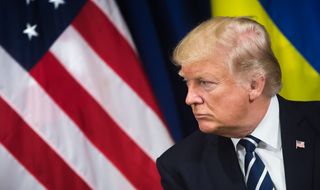Twitter disables Trump tweet due to copyright issues
Trump versus Twitter saga continues after Twitter disables video tribute to George Floyd

President Donald Trump’s 2020 campaign tweeted a video tribute to George Floyd on Thursday. Twitter has since disabled the tweet. The video, which is available on YouTube, Facebook and Instagram, features a collection of photos and videos of protest marches and rioters. Twitter removed the video shortly after it was posted, citing copyright complaints related to it.
The nearly four-minute-long video was first posted to the Team Trump Twitter account on Thursday afternoon. In the video, President Trump can be heard speaking about the tragedy of Floyd’s death while images of Floyd and peaceful protesters mourning his death pan in and out of the frame.
Later in the video, President Trump speaks of the violence from “radical leftwing groups” while highlighting images of riots, looting and destruction of property. President Trump ends the video, calling for “healing, not hatred.”
Twitter received at least one complaint from a copyright owner of at least one of the images in the video, a Twitter spokesperson told The Hill. In response to the complaint, Harvard University's Lumen Database, a third-party research group used by Twitter, reviewed it and determined the complaint to be valid under the Digital Millennium Copyright Act.
Andrew Clark, a spokesman for the Trump campaign called Twitter’s move “yet another reminder that Twitter is making up the rules as they go along.” Adding, “Twitter has repeatedly failed to explain why their rules seem to only apply to the Trump campaign but not to others. Censoring out the president’s important message of unity around the George Floyd protests is an unfortunate escalation of this double standard.”
This isn’t the president’s first spat with Twitter. President Trump and the social media platform have been embroiled in an ongoing saga that has included Twitter fact-checking and restricting a selection of President Trumps’ tweets. In response, the president signed an executive order targeting social media companies and Section 230 of the Communications Decency Act 1996.
Get the ITPro. daily newsletter
Receive our latest news, industry updates, featured resources and more. Sign up today to receive our FREE report on AI cyber crime & security - newly updated for 2024.




